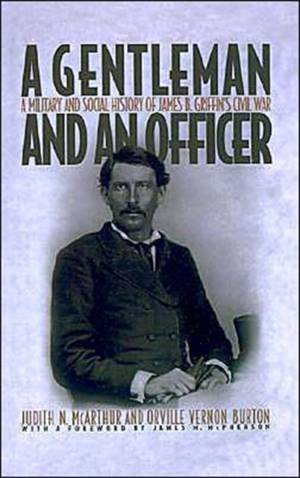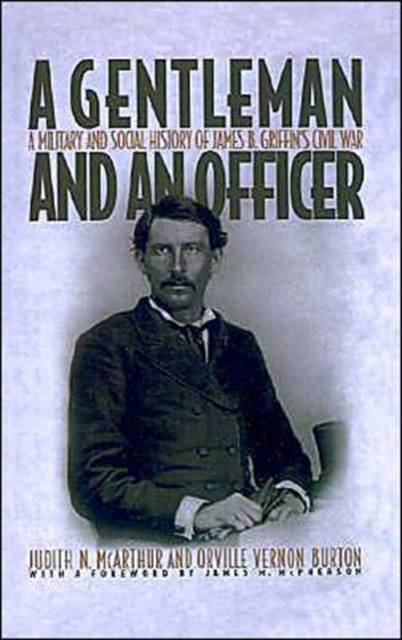
- Retrait gratuit dans votre magasin Club
- 7.000.000 titres dans notre catalogue
- Payer en toute sécurité
- Toujours un magasin près de chez vous
- Retrait gratuit dans votre magasin Club
- 7.000.000 titres dans notre catalogue
- Payer en toute sécurité
- Toujours un magasin près de chez vous
A Gentleman and an Officer
A Social and Military History of James B. Griffin's Civil War
Judith N McArthur, Orville Vernon Burton
Livre relié | Anglais
122,45 €
+ 244 points
Description
In 1861, James B. Griffin left Edgefield, South Carolina and rode off to Virginia to take up duty with the Confederate Army in a style that befitted a Southern gentleman: on a fine-blooded horse, with two slaves to wait on him, two trunks, and his favorite hunting dog. He was thirty-five years old, a wealthy planter, and the owner of sixty-one slaves when he joined Wade Hampton's elite Legion as a major of cavalry. He left behind seven children, the eldest only twelve, and a wife who was eight and a half months pregnant. As a field officer in a prestigious unit, the opportunities for fame and glory seemed limitless. Griffin, however, performed no daring acts, nor did he inspire great loyalty in his men. Instead, he unknowingly provided a unique and invaluable portrait of the Confederate officers who formed the core of Southern political, military, and business leadership.
In A Gentleman and an Officer, Judith N. McArthur and Orville Vernon Burton have collected eighty of Griffin's letters written at the Virginia front, and during later postings on the South Carolina coast, to his wife Leila Burt Griffin. Extraordinary in their breadth and volume, the letters encompass Griffin's entire Civil War service, detailing living conditions and military maneuvers, the jockeying for position among officers, and the different ways officers and enlisted men interacted during the Civil War. Unlike the reminiscences and biographies of high-ranking, well-known Confederate officers or studies and edited collections of letters of members of the rank and file, this collection sheds light on the life of a middle officer--a life turned upside down by extreme military hardship and complicated further by the continuing need for reassurance about personal valor and status common to men of the southern gentry. In these letters, Griffin describes secret troop movements in various military actions such as the Hampton Legion's role in the Peninsula Campaign (details that would certainly have been censored in more recent wars). Here he relates the march from Manassas to Fredricksburg, the siege of Yorktown and the retreat to Richmond, and the fighting at Eltham's landing and Seven Pines, where Griffin commanded the legion after Hampton was wounded. Throughout, as Griffin recounts these most extraordinary of times, he illuminates the most ordinary of day-to-day issues. One might expect to find a Confederate officer meditating on slavery, emancipation, or Lincoln. Instead, we are confronted by simple humanity and simple concerns, from the weather to gossip. Monumental historical events intruded on Griffin's life and sent him off to war, but his heartfelt considerations were about his family, his community, and his own personal pride. Ultimately, Griffin's letters present the Civil War as the refinery, the ordeal by fire, that tested and verified--or modified--Southern upperclass values.
With a fascinating combination of military and social history, A Gentleman and an Officer moves from the beginning of the Civil War at Fort Sumter through the end of the war and Reconstruction, vividly illustrating how the issues of the Civil War were at once devastatingly national and revealingly local.
In A Gentleman and an Officer, Judith N. McArthur and Orville Vernon Burton have collected eighty of Griffin's letters written at the Virginia front, and during later postings on the South Carolina coast, to his wife Leila Burt Griffin. Extraordinary in their breadth and volume, the letters encompass Griffin's entire Civil War service, detailing living conditions and military maneuvers, the jockeying for position among officers, and the different ways officers and enlisted men interacted during the Civil War. Unlike the reminiscences and biographies of high-ranking, well-known Confederate officers or studies and edited collections of letters of members of the rank and file, this collection sheds light on the life of a middle officer--a life turned upside down by extreme military hardship and complicated further by the continuing need for reassurance about personal valor and status common to men of the southern gentry. In these letters, Griffin describes secret troop movements in various military actions such as the Hampton Legion's role in the Peninsula Campaign (details that would certainly have been censored in more recent wars). Here he relates the march from Manassas to Fredricksburg, the siege of Yorktown and the retreat to Richmond, and the fighting at Eltham's landing and Seven Pines, where Griffin commanded the legion after Hampton was wounded. Throughout, as Griffin recounts these most extraordinary of times, he illuminates the most ordinary of day-to-day issues. One might expect to find a Confederate officer meditating on slavery, emancipation, or Lincoln. Instead, we are confronted by simple humanity and simple concerns, from the weather to gossip. Monumental historical events intruded on Griffin's life and sent him off to war, but his heartfelt considerations were about his family, his community, and his own personal pride. Ultimately, Griffin's letters present the Civil War as the refinery, the ordeal by fire, that tested and verified--or modified--Southern upperclass values.
With a fascinating combination of military and social history, A Gentleman and an Officer moves from the beginning of the Civil War at Fort Sumter through the end of the war and Reconstruction, vividly illustrating how the issues of the Civil War were at once devastatingly national and revealingly local.
Spécifications
Parties prenantes
- Auteur(s) :
- Editeur:
Contenu
- Nombre de pages :
- 392
- Langue:
- Anglais
Caractéristiques
- EAN:
- 9780195093117
- Date de parution :
- 19-12-96
- Format:
- Livre relié
- Format numérique:
- Genaaid
- Dimensions :
- 148 mm x 225 mm
- Poids :
- 675 g







